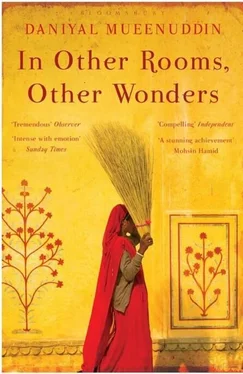Zainab now slept the night in Jaglani’s bed. She brought many of her things, clothes and jewelry, her makeup, and put them about the house. Seeing these little tokens of her presence made him happy, made him feel that he possessed her. She asked him to buy a buffalo, and twice a day, at dawn and at dusk, the villager who cared for the animal would bring a pail of the rich milk and leave it just inside the courtyard, covered with a cloth. She made ghee and butter, and if some was left over she sent it to Mustafa’s house, or to the house of one of the poorer neighbors who couldn’t afford to keep a buffalo. Only in the mornings, when Jaglani wanted to hold her, to lie in bed with her and talk quietly, or perhaps to make love, she still would not stay with him, but became restless and would get up, saying that she needed to begin the day. Although she did not like being touched, except when in bed, he found that now she tried to accept his caresses, tried not to be cold to him. When he came into the house and approached her from behind as she stood doing some household task, cupping her breasts in his hands, she became still and turned her head, smiling, and only after a moment would she disengage from him. Even then she would hold his hand and lead him outside, seating him on the charpoy and bringing his hookah. He became familiar with the smallest aspects of her body. She cut her toenails one day, but cut too far, into the quick, an inverted half-moon, until one of the nails bled. He loved this wildness in her, evidence of hardness toward herself, contained violence.
She developed a urinary infection, and he took her into town. She rode in the back of his jeep, and as always her brother Mustafa drove. None of them spoke. She kept her head covered, and didn’t look out of the window. Even this trip, their first together, became for him a significant memory. He wanted to take care of her, but often she would not allow him to. When he returned to Dunyapur after spending a few days in Firoza with his senior wife, as he drove toward the river he would feel a weight on his stomach. He feared Zainab, strangely enough, although he had made a career of fearing no one and of thereby dominating this lawless area. Sometimes he thought that it would be a relief to be rid of her, and yet his love kept increasing.
He became slightly complacent, finding her softer than he had imagined. After they made love she would lie next to him in the dark, tracing her fingers on his back and leaning down to kiss him. Before the marriage he always had been the one to caress her, while she lay with her back to him, curled into his body, her eyes open, rigid and seemingly resentful of having opened herself, not only physically but also emotionally, at least in the moments of sex.
She had blamed her husband for her failure to conceive. A year after her second marriage Jaglani arrived at dusk from Firoza. Mustafa drove the jeep into the dera, the headlights illuminating the banyan, the tractors standing in a row along the wall, plows and harrows and disks here and there. The watchman stood up, leaning on his long stick, and shielded his eyes with one hand. Another summer had passed, another monsoon. The jasmine planted along the high mud walls that enclosed the dera gave off its strong sweet smell. Jaglani liked flowers, and he also believed that the farm ran best when the roads were kept immaculate and smooth and the buildings whitewashed and adorned with flowers and trees. Order begat order.
Walking into the house, he found the fire out and the light off, although he had sent word in the morning that he would be returning to the farm. Inside Zainab sat in the dark on the edge of the bed.
‘Why no lights?’ he asked, flipping the switch.
She had not dressed up, but wore wrinkled clothes.
‘Do you know what day this is?’
‘No.’
‘The day we married, last year.’ She paused. ‘You know, I thought I didn’t have children with Aslam because he couldn’t. But it’s me.’ She almost began to cry, but then stopped herself. Her face became hard. ‘I only married you because of that.’
Cut badly, he said, ‘You had no choice. How long would your sister-in-law have treated you well? You came like a beggar.’
‘I never begged, but now I’ll beg from you. I’ll bow down. I beg you, give me one of your sons’ children to bring up. Shabir has three daughters. The little one, give me her. He has his sons, he’ll still have them and the other girls. The little one is only a few months old, she won’t even know that I’m not her real mother. Give her to me, I beg you, and I’ll never ask for anything again.’ She began to cry, through her teeth. ‘I beg you, I beg you, I beg you. I’ve served you. I belong to you, you know I do. Give me the little girl. Shabir doesn’t even want her, you know he doesn’t.’
He refused. ‘I can’t, my family doesn’t know we’re married.’
That winter Jaglani decided to run for office, for the Provincial Assembly. The local powers, the people above him, the Makhdooms, hereditary saints who controlled huge areas of land nearby and who could hand out Muslim League tickets, sent people to Jaglani and offered to help get him elected. He went to Lahore and received the blessing of K. K. Harouni. As a preliminary to the election, in order to prevent his opponent from using it against him, Jaglani disclosed the secret of his marriage to Zainab. He gave his wife and children no opportunity to respond — he announced it to them. The villagers had already guessed, but now had it confirmed. Others found out.
No one thought anything of it, he ruled his area in the old way, with force. He had the prerogative of taking a second wife, a chosen wife. Flushed with his power, Jaglani went further. He brought his son’s infant daughter to Dunyapur and gave her to Zainab, to nurse and to bring up.
Another year passed. Jaglani had been elected to the Provincial Assembly by a wide margin, and thus spent his time either in Lahore attending sessions or at the farm, hearing the petitions and complaints of his constituents, the people from the area. His district ran along both sides of the Indus River, and the people on the far side came across on a wooden ferry, flat-bottomed and large enough to hold twenty people, pushed along on long sweeps by an old man, whose body had remained muscular, but whose skin hung off him wherever the muscles didn’t extend.
One of Jaglani’s first acts on entering office had been to move it from another spot five miles downstream to a little bay on the river immediately next to Dunyapur, over the protests of those who found the original situation more convenient. The ferry had served the village of the man who stood against Jaglani in the election, and by moving the ferry he showed the entire district his new powers. He had new bricked roads built to meet the ferry at each bank of the river, and these roads greatly increased the value of Jaglani’s lands and the lands of his friends. Jaglani could order men arrested or released, could appoint them to government posts, could have government officers removed. He decided whose villages the new roads passed through, decided which areas got electricity, manipulated the flow of water through the canals. He could settle cases, even cases of murder, by imposing a reconciliation upon the two parties and ordering the police not to interfere. These new powers changed him. Because he had no higher ambitions, he became impartial. By temperament orderly, within this isolated area he sought to impose harmony and prosperity.
Coming into the house one afternoon, Jaglani did not find Zainab in the little kitchen preparing his food. He called.
‘Where are you?’
‘In my room,’ she replied, speaking in her gentle voice, which he liked so much. ‘Come in, come see.’
Читать дальше












